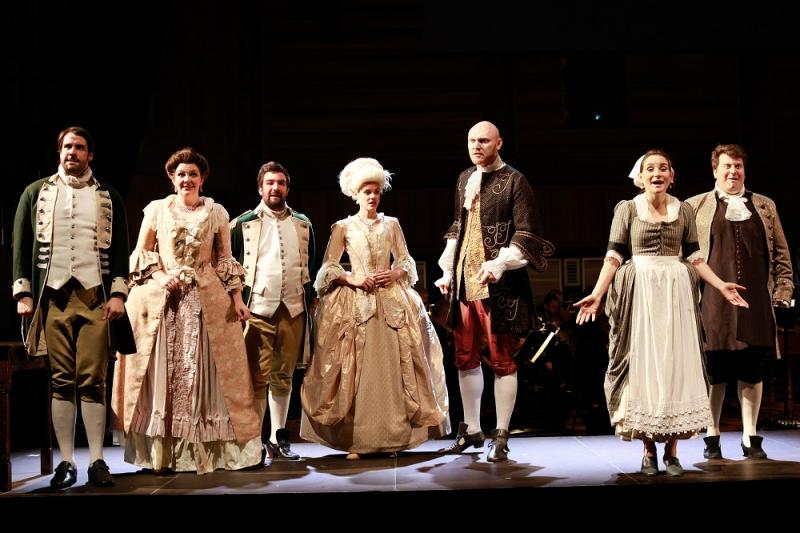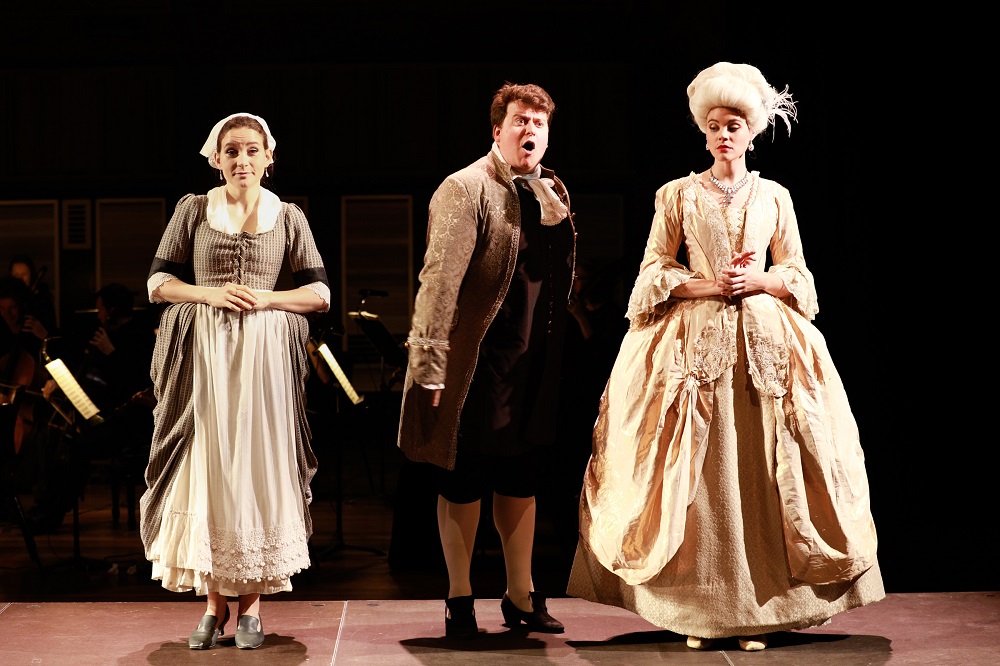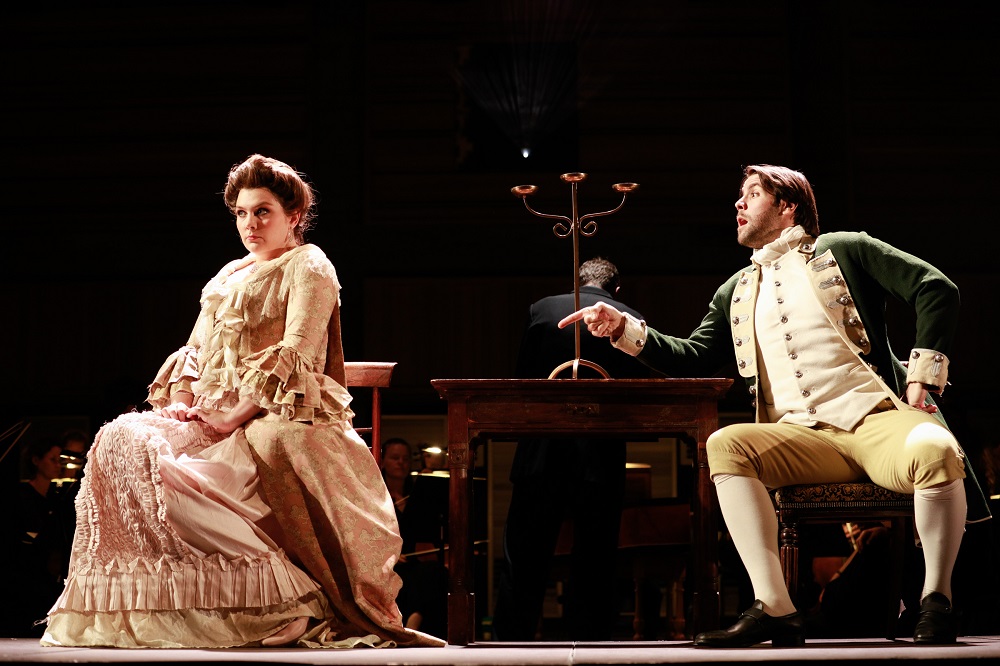La finta semplice, Classical Opera, QEH review - consummate musicianship stokes early Mozart | reviews, news & interviews
La finta semplice, Classical Opera, QEH review - consummate musicianship stokes early Mozart
La finta semplice, Classical Opera, QEH review - consummate musicianship stokes early Mozart
At 12, he was a very clever boy rather than a genius, but style carries this comic opera

You can always be sure of impeccable casting and spirited playing as Ian Page takes his Classical Opera through Mozart year by year. Just don't expect more than the glimmer of genius to come in 1768, though.
Was a fine team enough to carry it? Eventually, though you wait through a long first act for more than the very basic mechanics of opera buffa. The overture has a lively third section (the three movements made up an early symphony). It’s good to get a quartet serving as a cheap chorus to steel us for the perfunctory arias to come, though in the first of many contradictory sentiments, the tenet “freedom is better than love” doesn’t seem suitable for this amorous imbroglio. Giacinta (lustrous Austrian mezzo Sophie Rennert, perhaps the most vivid actor of the company) wants to marry a Hungarian captain oddly called Fracasso (Thomas Elwin, perhaps the least relaxed in Page’s perfectly competent staging) but she needs to get her mysogynist and idiot brothers to accept him. How? Set Fracasso’s sister Rosina on them as the “feigned simpleton” of the title who will promise to marry them both.  The ensuing shenanigans could be sharp and funny. They aren’t, but one of the two dupes and their guller have some good music. Rosina seeks to be guarded against the arrows of little cupids in an Act 2 aria, “Amoretti che ascosi,” complete with surprisingly sophisticated sighs and trills from the strings. Soprano Regula Mühlemann (pictured above on the right with Chiara Skerath and Alessandro Fisher) sings it, and all else, exquisitely. And the fall guy Don Polidoro gets a schizoid number pointing forward to the two-gear "Tradito, schernito" of Ferrando in Così fan tutte. In it, he's ardent and tender to the woman he supposedly doesn’t know how to woo (“Sposa cara”) while railing against his drunken brother. Given tenor Alessandro Fisher’s honeyed tones, Rosina might have done better to choose him; why she falls for Don Cassandro is a mystery, especially since Lukas Jakobski overplays his hand, if resplendently.
The ensuing shenanigans could be sharp and funny. They aren’t, but one of the two dupes and their guller have some good music. Rosina seeks to be guarded against the arrows of little cupids in an Act 2 aria, “Amoretti che ascosi,” complete with surprisingly sophisticated sighs and trills from the strings. Soprano Regula Mühlemann (pictured above on the right with Chiara Skerath and Alessandro Fisher) sings it, and all else, exquisitely. And the fall guy Don Polidoro gets a schizoid number pointing forward to the two-gear "Tradito, schernito" of Ferrando in Così fan tutte. In it, he's ardent and tender to the woman he supposedly doesn’t know how to woo (“Sposa cara”) while railing against his drunken brother. Given tenor Alessandro Fisher’s honeyed tones, Rosina might have done better to choose him; why she falls for Don Cassandro is a mystery, especially since Lukas Jakobski overplays his hand, if resplendently.
There are pretty ditties for maid Ninetta, delivered by Chiara Skerath with style and bags of character, and bluff ones for her reluctant wooer Simone (engaging bass superb Božidar Smiljanić). Giacinta, clearly the terza donna or third lady in Mozart’s pecking-order, gets a belated, brief but precociously intense Sturm und Drang number as she quails at the thought of one brother's wrath, and a G major plea for forgiveness in a finale of many tempi, backed up by Ninetta, which may have rung anticipatory bells for many listeners familiar with the Count’s similar asking towards the end of The Marriage of Figaro.  Rennert (pictured above with Smiljanić) delivered both impeccably; we wait to see her here in something more substantial (she gave the most moving account I’ve heard of Dido’s lament in the 2014 Europe Day Concert, and was superb as Handel's Lotario at the 2017 Göttingen International Handel Festival). And the whole evening passed tolerably at worst, vividly at best, with fabulous continuo support for the keenly articulated recitatives from Pawel Siwczak, Alex Rolton and the vivid double bass of Cecelia Bruggemeyer. The acoustics of the revamped Queen Elizabeth Hall can be a bit too swimmy for this music, and Page posed a few problems by having the singers so far in front of the orchestra, but he was quick to catch them when togetherness threatened to falter. When the recording eventually emerges, it will be the one to have if you want this in your Mozart discography.
Rennert (pictured above with Smiljanić) delivered both impeccably; we wait to see her here in something more substantial (she gave the most moving account I’ve heard of Dido’s lament in the 2014 Europe Day Concert, and was superb as Handel's Lotario at the 2017 Göttingen International Handel Festival). And the whole evening passed tolerably at worst, vividly at best, with fabulous continuo support for the keenly articulated recitatives from Pawel Siwczak, Alex Rolton and the vivid double bass of Cecelia Bruggemeyer. The acoustics of the revamped Queen Elizabeth Hall can be a bit too swimmy for this music, and Page posed a few problems by having the singers so far in front of the orchestra, but he was quick to catch them when togetherness threatened to falter. When the recording eventually emerges, it will be the one to have if you want this in your Mozart discography.
rating
Explore topics
Share this article
The future of Arts Journalism
You can stop theartsdesk.com closing!
We urgently need financing to survive. Our fundraising drive has thus far raised £49,000 but we need to reach £100,000 or we will be forced to close. Please contribute here: https://gofund.me/c3f6033d
And if you can forward this information to anyone who might assist, we’d be grateful.

Subscribe to theartsdesk.com
Thank you for continuing to read our work on theartsdesk.com. For unlimited access to every article in its entirety, including our archive of more than 15,000 pieces, we're asking for £5 per month or £40 per year. We feel it's a very good deal, and hope you do too.
To take a subscription now simply click here.
And if you're looking for that extra gift for a friend or family member, why not treat them to a theartsdesk.com gift subscription?
more Opera
 Buxton International Festival 2025 review - a lavish offering of smaller-scale work
Allison Cook stands out in a fascinating integrated double bill of Bernstein and Poulenc
Buxton International Festival 2025 review - a lavish offering of smaller-scale work
Allison Cook stands out in a fascinating integrated double bill of Bernstein and Poulenc
 Tosca, Clonter Opera review - beauty and integrity in miniature
Happy surprises and a convincing interpretation of Puccini for today
Tosca, Clonter Opera review - beauty and integrity in miniature
Happy surprises and a convincing interpretation of Puccini for today
 Hamlet, Buxton International Festival review - how to re-imagine re-imagined Shakespeare
Music comes first in very 19th century, very Romantic, very French operatic creation
Hamlet, Buxton International Festival review - how to re-imagine re-imagined Shakespeare
Music comes first in very 19th century, very Romantic, very French operatic creation
 Falstaff, Glyndebourne review - knockabout and nostalgia in postwar Windsor
A fat knight to remember, and snappy stagecraft, overcome some tedious waits
Falstaff, Glyndebourne review - knockabout and nostalgia in postwar Windsor
A fat knight to remember, and snappy stagecraft, overcome some tedious waits
 Salome, LSO, Pappano, Barbican review - a partnership in a million
Asmik Grigorian is vocal perfection in league with a great conductor and orchestra
Salome, LSO, Pappano, Barbican review - a partnership in a million
Asmik Grigorian is vocal perfection in league with a great conductor and orchestra
 Semele, Royal Opera review - unholy smoke
Style comes and goes in a justifiably dark treatment of Handelian myth
Semele, Royal Opera review - unholy smoke
Style comes and goes in a justifiably dark treatment of Handelian myth
 Le nozze di Figaro, Glyndebourne review - perceptive humanity in period setting
Mostly glorious cast, sharp ideas, fussy conducting
Le nozze di Figaro, Glyndebourne review - perceptive humanity in period setting
Mostly glorious cast, sharp ideas, fussy conducting
 Fidelio, Garsington Opera review - a battle of sunshine and shadows
Intimacy yields to spectacle as Beethoven's light of freedom triumphs
Fidelio, Garsington Opera review - a battle of sunshine and shadows
Intimacy yields to spectacle as Beethoven's light of freedom triumphs
 Dangerous Matter, RNCM, Manchester review - opera meets science in an 18th century tale
Big doses of history and didaction are injected into 50 minutes of music theatre
Dangerous Matter, RNCM, Manchester review - opera meets science in an 18th century tale
Big doses of history and didaction are injected into 50 minutes of music theatre
 Mazeppa, Grange Park Opera review - a gripping reassessment
Unbalanced drama with a powerful core, uninhibitedly staged
Mazeppa, Grange Park Opera review - a gripping reassessment
Unbalanced drama with a powerful core, uninhibitedly staged
 Saul, Glyndebourne review - playful, visually ravishing descent into darkness
Ten years after it first opened Barrie Kosky's production still packs a hefty punch
Saul, Glyndebourne review - playful, visually ravishing descent into darkness
Ten years after it first opened Barrie Kosky's production still packs a hefty punch
 Così fan tutte, Nevill Holt Festival/Opera North review - re-writing the script
Real feeling turns the tables on stage artifice in Mozart that charms, and moves
Così fan tutte, Nevill Holt Festival/Opera North review - re-writing the script
Real feeling turns the tables on stage artifice in Mozart that charms, and moves

Add comment